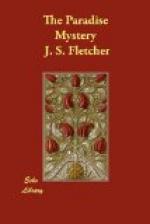Bryce at first sight took them to be a copy of some inscription but his knowledge of Latin told him, a moment later, that instead of being an inscription, it was a direction. And a very plain direction, too!—he read it easily. In Paradise, at Wrychester, next to, or near, the tomb of Richard Jenkins, or, possibly, Jenkinson, from, or behind, the head, twenty-three, fifteen—inches, most likely. There was no doubt that there was the meaning of the words. What, now, was it that lay behind the tomb of Richard Jenkins, or Jenkinson, in Wrychester Paradise?—in all probability twenty-three inches from the head-stone, and fifteen inches beneath the surface. That was a question which Bryce immediately resolved to find a satisfactory answer to; in the meantime there were other questions which he set down in order on his mental tablets. They were these:
1. Who, really, was the man who had registered
at the
Mitre under the name
of John Braden?
2. Why did he wish to make a personal
call on the
Duke of Saxonsteade?
3. Was he some man who had known Ransford
in time
past—and
whom Ransford had no desire to meet again?
4. Did Ransford meet him—in the Cathedral?
5. Was it Ransford who flung him to his
death down
St. Wrytha’s Stair?
6. Was that the real reason of the agitation
in which
he, Bryce, had found
Ransford a few moments after
the discovery of the
body?
There was plenty of time before him for the due solution of these mysteries, reflected Bryce—and for solving another problem which might possibly have some relationship to them —that of the exact connection between Ransford and his two wards. Bryce, in telling Ransford that morning of what was being said amongst the tea-table circles of the old cathedral city, had purposely only told him half a tale. He knew, and had known for months, that the society of the Close was greatly exercised over the position of the Ransford menage. Ransford, a bachelor, a well-preserved, active, alert man who was certainly of no more than middle age and did not look his years, had come to Wrychester only a few years previously, and had never shown any signs of forsaking his single state. No one had ever heard him mention his family or relations; then, suddenly, without warning, he had brought into his house Mary Bewery, a handsome young woman of nineteen, who was said to have only just left school, and her brother Richard, then a boy of sixteen, who had certainly been at a public school of repute and was entered at the famous Dean’s School of Wrychester as soon as he came to his new home. Dr. Ransford spoke of these two as his wards, without further explanation; the society of the Close was beginning to want much more explanation. Who were they—these two young people? Was Dr. Ransford their uncle, their cousin—what was he to them? In any case, in the opinion of the elderly ladies who set the tone of society in Wrychester, Miss Bewery was much too young, and far too pretty, to be left without a chaperon. But, up to then, no one had dared to say as much to Dr. Ransford—instead, everybody said it freely behind his back.




